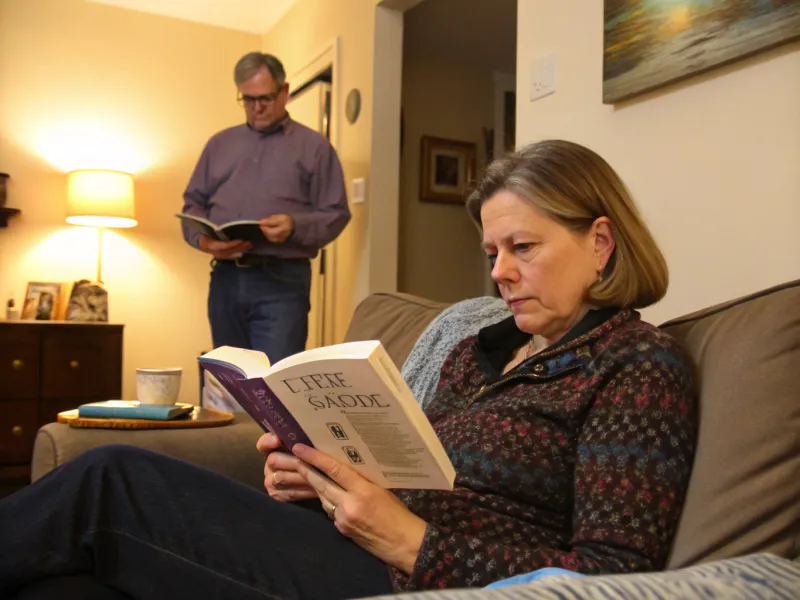33 Deal-Breakers That Lead 55+ Women To Walk Away For Good
At a certain point in life, you realize the worth of your peace and happiness. As a woman over 55, your life is a tapestry of experiences and lessons learned.
You’ve grown into your own, with clarity about what you will and will not tolerate. Walking away isn’t a sign of defeat; it’s an assertion of self-worth and boundaries.
This is a discussion of the pivotal deal-breakers that compel women to make the empowering decision to prioritize our well-being.
Here, we explore 33 unique deal-breakers that have been identified through years of insight and reflection, each resonating with the core of our values and aspirations.
1. Emotional Neglect

Emotional neglect in a relationship isn’t always overt. You might find yourself feeling invisible, your thoughts and feelings unacknowledged. It’s as if your voice echoes in an empty, unresponsive space. Such disregard chips away at your confidence and joy.
Imagine needing support and finding none. Over time, this emotional void creates a chasm of loneliness. It’s a deal-breaker because, by now, you know the value of emotional reciprocity.
You’re not asking for the moon, just the awareness that your feelings matter. When emotional neglect becomes a pattern, it’s a clear sign to walk away. After all, a fulfilling relationship is built on mutual care and attention.
2. Dishonesty

Trust is the cornerstone of any meaningful relationship, and dishonesty shatters it. Whether it’s small lies or significant deceptions, dishonesty erodes the foundation you’ve worked hard to build.
You’ve spent decades learning and growing, and dishonesty is simply unacceptable. It disrespects your intelligence and intuition, making you question everything.
Walking away from dishonesty isn’t about giving up; it’s about preserving your dignity and self-respect. You deserve truthfulness and transparency in your relationships, and when that’s compromised, it’s a definitive deal-breaker.
3. Financial Irresponsibility

In your 50s and beyond, financial stability becomes increasingly significant. A partner who is financially irresponsible can threaten your security and peace of mind.
Imagine constantly worrying about unpaid bills, debts, or reckless spending habits. It’s exhausting and unsustainable.
Financial irresponsibility signifies a lack of planning and respect for shared goals. Walking away becomes necessary when your partner’s habits jeopardize your well-being. Financial harmony is crucial, and you deserve someone who shares your commitment to it.
4. Lack of Respect

Respect isn’t just about manners; it’s about valuing someone’s thoughts, opinions, and boundaries. A lack of respect manifests in subtle ways, such as dismissive gestures or condescending remarks.
You know your worth and the importance of mutual respect. When someone consistently undervalues you, it’s demoralizing.
Choosing to walk away from disrespect is empowering. It affirms your self-worth and your right to be treated with dignity. Relationships are about equality, and respect is non-negotiable.
5. Unwillingness to Grow

Life is about growth and change, and a partner unwilling to evolve can stifle your own progress. You’re eager to learn, experience, and grow, and you need a partner who shares that enthusiasm.
Being with someone stuck in their ways can feel suffocating. It limits your potential and happiness.
Walking away from stagnation is about choosing a life of continuous growth. You want a relationship that’s dynamic and inspiring, not one that’s static and restrictive.
6. Toxic Behaviors

Toxic behaviors, such as manipulation, gaslighting, or constant criticism, drain your emotional energy. These behaviors can subtly erode your confidence and distort your reality.
You’ve learned to recognize these behaviors and understand their impact. You’re no longer willing to sacrifice your well-being for the sake of maintaining a relationship.
Walking away from toxicity is a powerful act of self-preservation. You deserve a relationship that uplifts and supports you, free from negativity and harm.
7. Lack of Communication

Clear and open dialogue is the foundation of any strong relationship. When communication falters, misunderstandings and resentment can take root, leaving both partners feeling disconnected.
Feeling unheard or misunderstood is isolating, creating an emotional void that grows over time. It becomes harder to address issues or share meaningful moments when communication is absent.
Choosing to walk away from poor communication is an act of self-preservation. Building a future with someone who values open and honest dialogue is essential for a fulfilling partnership.
8. Incompatibility

Incompatibility often stems from mismatched goals or values rather than surface-level differences. Over time, divergent paths can create a chasm that feels impossible to bridge.
Recognizing what matters most to you helps clarify whether your partner’s vision for the future aligns with yours. When the divide grows too wide, it’s a signal to reassess the relationship.
Seeking alignment is about honoring your values and finding a partner whose journey complements your own. A shared vision creates the foundation for a stronger, more harmonious connection.
9. Emotional Immaturity

The ability to handle life’s ups and downs with understanding and grace is crucial in a partner. Without this maturity, disagreements can quickly spiral into chaos.
Managing emotions responsibly is a sign of personal growth. When emotional immaturity dominates, it introduces unnecessary conflict and instability into the relationship.
Prioritizing emotional balance is about protecting your peace and well-being. A mature partnership fosters harmony and mutual respect, ensuring that both individuals can thrive.
10. Controlling Behavior

Control can show itself in subtle or overt ways, whether it’s micromanaging decisions or isolating you from loved ones. It stifles individuality and chips away at your autonomy.
A healthy relationship empowers rather than restricts. True love allows you to flourish, not feel suffocated or constrained.
Breaking free from a controlling dynamic is a powerful step toward reclaiming your independence. Partnerships thrive when built on trust and equality, not domination or manipulation.
11. Unresolved Past Issues

Unresolved issues from the past often cast shadows over the present. A partner unwilling to confront and address their emotional baggage can hold the relationship back.
Healing requires addressing the past and moving forward without carrying its burdens. Lingering issues prevent growth and block the path to happiness.
Choosing to leave such a relationship is about prioritizing a future unencumbered by old wounds. A present-focused partnership paves the way for progress and joy.
12. Infidelity

Infidelity shatters the foundation of trust and creates wounds that are difficult to heal. It disrupts the balance of a relationship, leaving lasting emotional scars.
Trust and loyalty are essential for love to flourish. When that trust is broken, it often signals the end of the shared commitment.
Deciding to walk away after infidelity is about safeguarding your emotional well-being. A partner who values fidelity as much as you do is key to building a secure and enduring connection.
13. Neglecting Self-Care

A lack of self-care can impact not only an individual but the relationship as a whole. Disregarding health or well-being creates strain and sets a troubling precedent for the future.
Prioritizing self-care reflects a commitment to living fully and actively. Sharing that journey with a partner who values their health strengthens the bond you share.
Choosing to leave when self-care is neglected is about ensuring a vibrant and balanced future. A partnership rooted in mutual wellness fosters a stronger, healthier connection.
14. Lack of Ambition

Ambition drives growth and keeps life exciting. Without it, stagnation takes over, creating frustration for a partner who is striving for more.
A lack of drive can limit the potential of a shared future. Partners who lack ambition may not share your desire for personal or mutual progress, creating an emotional divide.
Seeking a partner who matches your aspirations ensures that you can grow together. A shared passion for striving toward goals enhances your connection and builds a fulfilling life.
15. Neglecting Family

Family relationships are often the cornerstone of happiness, yet a partner who neglects these connections can create distance and disharmony.
Investing in family bonds demonstrates care and respect for shared values. A partner who remains disinterested in family life may struggle to integrate fully into your world.
Walking away from someone who disregards family is about prioritizing relationships that bring joy and unity. A supportive partner understands the importance of nurturing family ties and sharing in those meaningful moments.
16. Substance Abuse

Substance abuse impacts not only the individual but everyone around them. The chaos and instability it brings can erode trust and create an unhealthy environment.
Stability and health are non-negotiable in a lasting relationship. Addiction introduces turbulence and threatens the peace you’ve worked hard to maintain.
Choosing to leave such a situation is an act of self-protection. Prioritizing a relationship free from the turmoil of substance abuse allows space for mutual care and respect to flourish.
17. Jealousy

Jealousy introduces distrust and insecurity, suffocating the joy and connection in a relationship. Over time, it creates an environment of suspicion and unease.
Trust is the bedrock of any partnership. Constant doubts and baseless accusations make it impossible to build or maintain a healthy bond.
Walking away from jealousy is about preserving your integrity and emotional well-being. A relationship rooted in trust fosters peace and allows both partners to feel secure and valued.
18. Lack of Intimacy

Intimacy goes beyond physical affection—it’s about emotional closeness, shared understanding, and mutual connection. When intimacy is absent, the relationship starts to feel empty.
A deep connection brings joy and fulfillment, creating a sense of togetherness that sustains the partnership. Without it, the bond weakens over time.
Leaving a relationship lacking intimacy honors your need for closeness and emotional fulfillment. A partner who nurtures intimacy helps create a deeper, more satisfying connection.
19. Avoidance of Conflict

Conflict avoidance doesn’t eliminate problems; it simply postpones them. Issues left unaddressed create tension that eventually becomes unbearable.
Resolving conflicts is essential for growth. Avoidance fosters resentment and stifles progress, making it impossible to move forward together.
Walking away from someone who avoids conflict is about seeking openness and resolution. A relationship thrives when both partners are willing to face challenges head-on and work through them constructively.
20. Excessive Criticism

Relentless criticism chips away at confidence and self-esteem. Instead of encouraging growth, it focuses on flaws, creating an environment of negativity.
Self-love and acceptance are crucial for personal well-being. Constant criticism undermines that journey, leaving you feeling devalued and unsupported.
Leaving excessive criticism behind is about prioritizing self-worth. A supportive partner uplifts and celebrates you, fostering an environment where love and encouragement prevail.
21. Lack of Support

Support in a relationship is about being each other’s cheerleaders. Without it, achievements feel hollow and struggles feel heavier.
You’ve realized the importance of mutual support and encouragement. Its absence diminishes the joy of shared success.
Walking away from a lack of support is about finding a partner who celebrates and supports your journey. You deserve someone who stands by you, in triumph and challenge alike.
22. Inability to Compromise

The ability to find middle ground is essential for a harmonious relationship. When one partner is unwilling to meet halfway, it often leads to power struggles and unresolved conflicts.
Flexibility and understanding foster peace, while rigid behavior breeds tension. Living with inflexibility means constant conflict that drains emotional energy.
Choosing to leave is about prioritizing collaboration and shared understanding. A fulfilling relationship thrives on mutual effort to create balance and harmony.
23. Emotional Unavailability

Being emotionally unavailable creates a chasm that words alone cannot bridge. It’s not about physical presence but the inability to connect on a deeper level.
The warmth and comfort of emotional intimacy are irreplaceable. Its absence leaves a sense of isolation, even when you’re not alone.
Leaving a relationship marked by emotional distance allows you to seek a genuine connection. A partner who is emotionally present enriches your life and strengthens your bond.
24. Lack of Shared Interests

Shared interests bring vibrancy to a relationship, offering opportunities to bond over mutual joys. When these interests are absent, the connection can feel shallow.
Having personal passions is fulfilling, but sharing them with a partner adds another layer of meaning. A lack of common ground can leave the relationship feeling monotonous.
Walking away in search of shared enthusiasm is about prioritizing compatibility. A partner who shares or appreciates your hobbies fosters joy and a deeper connection.
25. Overreliance on Social Media

Excessive time spent on social media often creates a barrier to real-life intimacy. It steals attention from meaningful interactions, leaving the relationship feeling neglected.
Engaging in the present moment is crucial for building strong bonds. A relationship overshadowed by digital distractions struggles to maintain its depth.
Stepping away from this dynamic means prioritizing authentic connections. A partner who values presence and engagement ensures the relationship remains grounded and fulfilling.
26. Lack of Shared Values

Foundational values shape the trajectory of a relationship. When partners clash on priorities such as family, lifestyle, or long-term goals, it can create a disconnect that’s difficult to overcome.
Alignment in values brings clarity and strengthens the bond, especially during life’s pivotal moments. Without this alignment, misunderstandings and dissatisfaction tend to grow.
Choosing a path with shared principles is essential for lasting harmony. A partner whose values complement yours ensures the relationship can thrive with mutual respect and understanding.
27. Unwillingness to Apologize

The inability to apologize signals a deeper unwillingness to accept responsibility. This stubbornness not only strains the relationship but also fosters resentment over time.
Admitting mistakes and offering sincere apologies fosters trust and repair. A refusal to do so creates emotional barriers that are hard to overcome.
Walking away from such behavior is about seeking accountability and emotional maturity. A relationship grounded in mutual respect values humility and the willingness to make amends.
28. Inconsiderate Behavior

Neglecting small acts of consideration shows a disregard for your partner’s feelings and needs. Thoughtfulness is the thread that weaves care into daily interactions.
Kindness and awareness demonstrate love in meaningful ways. When these are absent, the relationship can feel one-sided and unbalanced.
Seeking a thoughtful and caring partner ensures mutual appreciation. A nurturing relationship thrives on small gestures that reinforce connection and respect.
29. Neglect of Romantic Gestures

Romantic gestures breathe life into a relationship, keeping the connection strong and vibrant. Ignoring these efforts can make the bond feel stagnant or unappreciated.
Cherishing romantic moments brings joy and strengthens intimacy. Without these expressions of love, the relationship risks losing its emotional spark.
Choosing to leave an unromantic partnership is about seeking vibrancy and passion. A relationship that values romance creates a sense of being loved and cherished every day.
30. Overcommitment to Work

Overcommitting to work often leaves little room for nurturing a relationship. The imbalance can lead to feelings of neglect and disconnection over time.
Balancing professional ambitions with personal relationships ensures harmony and stability. Neglecting this balance often results in emotional distance.
Prioritizing a relationship that values presence and quality time is essential for emotional well-being. A partner who makes time for connection builds a stronger, more resilient bond.
31. Inability to Forgive

The inability to forgive keeps wounds open and unresolved, creating a toxic cycle of resentment. It prevents growth and hinders the ability to move forward together.
Letting go of past grievances brings peace and fosters healing. Holding onto grudges, however, poisons the relationship and stifles emotional intimacy.
Walking away from such a dynamic is about seeking closure and emotional freedom. A healthy relationship requires forgiveness and a willingness to build anew.
32. Selfishness

Selfishness shifts the focus entirely onto one partner’s needs, leaving the other feeling undervalued. It creates an imbalance that erodes mutual respect and trust.
A balanced relationship values shared effort and care. When one person dominates, it limits the opportunity for growth and partnership.
Choosing equality and collaboration ensures a healthier connection. A partner who prioritizes shared goals and mutual consideration creates harmony in the relationship.
33. Failure to Acknowledge Achievements

Acknowledging achievements shows pride and appreciation for each other’s efforts. Ignoring these milestones diminishes the joy of shared accomplishments.
Celebrating success strengthens the bond and fosters encouragement. Its absence can leave one feeling unrecognized and unsupported.
Seeking a partner who celebrates your victories cultivates a relationship filled with pride and validation. Building each other up creates a supportive and inspiring connection.







